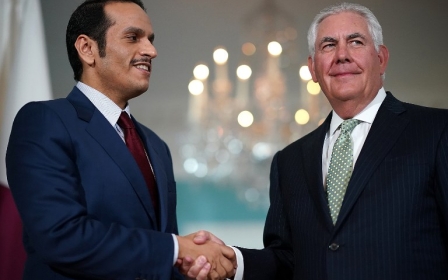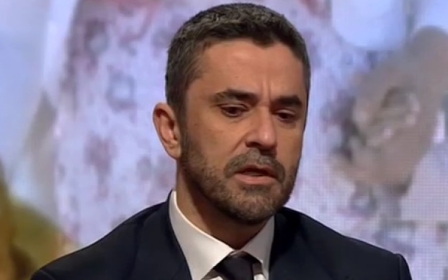Qatari currency facing crisis as Gulf blockade hits economy
British banks on Friday joined financial institutions around the world in ceasing the sale of Qatari riyals, as the blockade on Doha by its Gulf rivals began to show the first signs of economic damage.
Lloyds Bank, Bank of Scotland and Halifax, all operated by Lloyds Banking Group, stopped buying and selling the currency because their third-party suppliers stopped trading in riyals, the bank said in a statement.
Barclays' and Royal Bank of Scotland's retail foreign exchange service has also been affected in the same way.
A salesperson at Thomas Exchange Global Ltd, a exchange bureau based in Hammersmith, London, told Middle East Eye on Friday afternoon that his company had stopped buying Qatari riyal three weeks ago because, in turn, a third-party dealer had stopped buying the currency. They were still selling the currency, he said.
Qatar's central bank told the Reuters news agency earlier on Friday that reports of halted trading were "baseless", but Lloyds' decision follows similar moves by the Post Office, a major high street currency exchange in the UK.
The decision by British banks comes after international rating agencies lowered Qatar’s credit rating and put it on "negative watch" amid an ongoing Gulf dispute.
Banks in the US, India, Sri Lanka and Pakistan, among others, are also reported to have stopped trading in Qatari riyals.
The Financial Times newspaper said the moves in Britain reflected the "growing difficulties being caused by the Saudi and UAE-led blockade of Qatar".
Four of the kingdom’s Arab neighbours severed diplomatic ties and cut travel links to Qatar earlier this month, alleging that the government sponsors terrorism. They have provided no proof yet have issued a list of 13 demands, to be fulfilled by Monday.
The FT said Qatar's central bank insisted that the blockade posed no threat to its long-standing currency peg against the dollar.
However, low liquidity in spot markets - or immediate trading - meant institutions had been forced to trade the riyal outside its normal range of 3.64 riyals to one US dollar.
Earlier this week it traded as low as 3.7884, its weakest level since 1988 according to Bloomberg data.
That fall in value meant that selling the currency was now a loss-making venture for exchangers, said Omar Mohammed, of the international money transfer firm Imperial FX.
He told Doha News the problems could be explained by falling energy revenues and the exodus of international investment funds from Qatar since the start of the blockade.
"The Qatari riyal was trading on the futures market at an annual low, and they have recently been placed on a negative credit watch because portfolio investment funds have left the country so quickly," he told the website.
"Oil prices have fallen and experts are now voicing their concerns over the sustainability of Qatar’s energy revenues."
Many multinational businesses with bases in Qatar were also considering their future.
"Qatar is a valuable market for us and we want to continue here but it has become difficult and if there's no improvement we will have to review our strategy [in Qatar]," said a commercial manager at a European construction services company with a regional head office in UAE.
The company may be forced to stop bidding for new contracts in Qatar or wind down its operations altogether if sanctions intensify, said the manager, who declined to be named because of the sensitivity of the matter.
A Doha-based executive at an international engineering firm said the situation had already forced his company to delay some projects.
"As a satellite office in Qatar we rely on being able to bring staff across from UAE regularly. Several jobs have had to be postponed due to building materials being held up in Jebel Ali port (in UAE)," he said.
"Where necessary, employees have had to travel for seven hours via Oman to get to Qatar."
New MEE newsletter: Jerusalem Dispatch
Sign up to get the latest insights and analysis on Israel-Palestine, alongside Turkey Unpacked and other MEE newsletters
Middle East Eye delivers independent and unrivalled coverage and analysis of the Middle East, North Africa and beyond. To learn more about republishing this content and the associated fees, please fill out this form. More about MEE can be found here.




